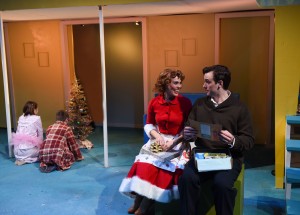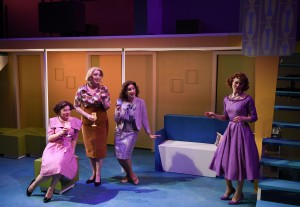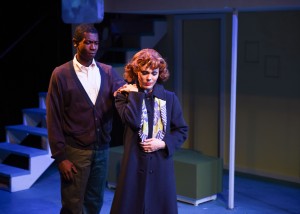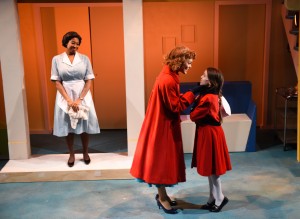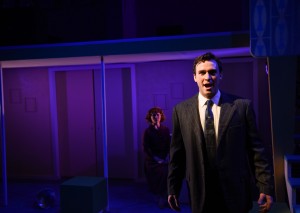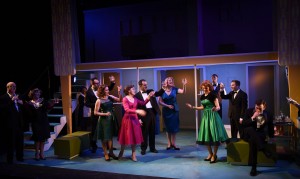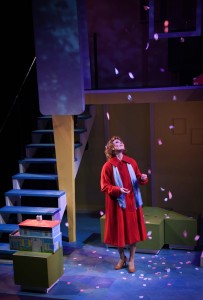THE HEART KEEPS ITS REASONS
Starring Julianne Moore and Dennis Quaid, Todd Haynes’ 2002 film Far From Heaven told a tale timeless as Romeo and Juliet. But its glimpse of hearts out of sync with their time and town was very time-specific. Haynes’s work is the kind of fiction where what might have been is remembered longer and better than what was. Because, well, it feels more right than what can’t occur.
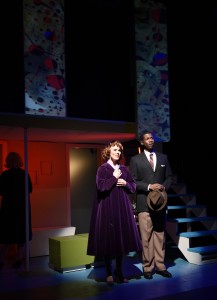 A Chicago premiere perfectly shaped by Rob Lindley, Porchlight Music Theatre’s latest offering depicts a “disheveling world,” as the embattled heroine puts it, where hope hurts hard. The bucolic locale is Hartford, Connecticut, good enough to start with, but the time is 1957 and love is limited. This show inhabits a world where “Nothing Happened” covers a ton of misery.
A Chicago premiere perfectly shaped by Rob Lindley, Porchlight Music Theatre’s latest offering depicts a “disheveling world,” as the embattled heroine puts it, where hope hurts hard. The bucolic locale is Hartford, Connecticut, good enough to start with, but the time is 1957 and love is limited. This show inhabits a world where “Nothing Happened” covers a ton of misery.
Created by the musical adaptors of Grey Gardens, the 140-minute musical—book by Richard Greenberg, music by Scott Frankel and lyrics by Michael Korie—hews to the original cinematic heartbreak. The songs elaborate the muted dreams of every disappointed soul in this hard luck saga. Frankel’s score is jazzy to exotic when alluding to the outside world, as in a trip to Havana (“Wandering Eyes”), but sardonic when domestic (the malicious “Interesting”). Only in the amorous anthems (the bonding duet “Miro” and “A Picture in Your Mind”) are emotions transparent and uninflected. Their sheer decency tellingly contrasts with the crafty songs.
A purportedly happy homemaker in this Eisenhower Era of family “togetherness” and the conformity of the “organization man,” doting mother Cathy Whitaker (pert Summer Naomi Smart) has become Mrs. Magnatech, the squeaky-clean, “whitebread” face of a T.V. brand. This picture-perfect helpmate is shakily married to occasionally tippling executive Frank (Brandon Springman, channeling Don Draper). Suburban stakeholders and a grown-up Dick and Jane, the winsome twosome preside over the archetypal two-kid, two-car, picket-fence, split-level retreat from reality. (No dogs or cats a la Spot and Puff, are, however, indicated.)
But, as generically entitled musical interludes “Table Talk,” “Phone Talk,” and “Office Talk” imply, all’s not well in this insular enclave. David has a double life that all but invites d-i-v-o-r-c-e. Crucially, bored beyond her Formica kitchenette, Cathy (reprising D.H. Lawrence’s Lady Chatterley from two generations before) is drawn to her African-American gardener Raymond Deagan (Evan Tyrone Martin), the single father of a 9-year-old daughter. This quiet man with sad eyes holds out the unconventional prospect of unconditional happiness or at least openness.
But Cathy’s “kindness to Negroes,” as it’s condescendingly reported in a local Hartford newspaper, is enough to get the gossips’ tongues wagging. Given worlds that barely overlap, let alone connect, their platonic affection has no means of support, as the first-act finale “The Only One” drives home with contagious pain. You can guess the rest, though, unlike 15th-century Verona, in this button-down realm love-crossed tragedy isn’t any more available than tolerance for forbidden passion. Differences in Cathy’s Pleasantville are not dynamic—they threaten the bogus security of “tea and sympathy.”
Pictured in pretty pastels and period projections, set designer Grant Sabin’s unhappy home is ground zero for strategic breakdowns (like an office party from hell). Life relentlessly exposes fantasy. Summer Smart, totally evoking Doris Day, Barbara Billingsley, Donna Reid, and Jane Wyatt, undermines the plastic parallels with her deeply anguished “Heaven Knows” (an arch reference to the show’s title). Bri Sudia is artfully disapproving as Cathy’s supposed best friend, especially in the ironic quartet “Marital Bliss,” full of forced harmonies. Perfectly coached by music director Chuck Larkin and choreographed by William Carlos Angulo, the ensemble inhabit the era like a cigarette commercial.
In Frank and Cathy’s bittersweet duet “I Never Knew,” you sense how willed ignorance passed as innocence three generations ago. Far From Heaven is a lot closer to hell.
Far From Heaven
Porchlight Music Theatre
Stage 773, 1225 W. Belmont Ave
ends on March 13, 2016
for tickets, call 773.327.5252 or visit Porchlight
for more Chicago Theater info,
visit Theatre in Chicago

